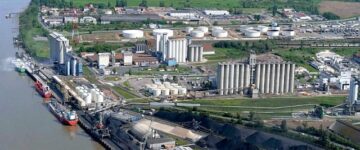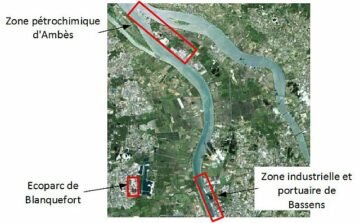Challenge(s)
How can port authorities reduce energy consumption?
Good practice
Pool resources on the basis of industrial ecology principles
To combat climate change effectively, it's crucial to find innovative ways to enhance the energy efficiency of both ports and cities. In 2013, the Atlantic Port of Bordeaux shifted its focus towards regional sustainability objectives, initiating efforts to facilitate an energy transition. Positive Energy and Economy Port (PÉÉPOS) seeks to encourage cooperation among diverse industrial entities and local communities, establishing innovative clusters to collaboratively redefine the future of the port.
Case study
The Atlantic Port of Bordeaux changed its regional sustainability goals and started by finding ways for energy transition in 2013. One of its significant initiatives, supported by the European Union’s SUNRISE project under the European Union’s Research and Innovation program, is a POSitive Energy and Economy Port (PÉÉPOS, Port à Energie et à Économie Positives). PÉÉPOS aims to foster collaboration among various industrial stakeholders and communities, creating forward-looking clusters to collectively shape a new port.
PÉÉPOS serves as a fundamental goal of the Port of Bordeaux’s Strategic Project, which ran from 2015 until 2020, with the objectives of reducing energy expenses, optimising production processes, and promoting new energy sources. PÉÉPOS Startup initiated a continuous improvement process by gaining in-depth knowledge of the port’s industrial activities and its partners. Following several energy audits, a partnership was established with ENGIE and EDF during a conference on the future of the port, organised by the Atlantic Port of Bordeaux and attended by nearly a hundred stakeholders.
In 2017, the Port of Bordeaux launched the second phase of the Péépos project – PÉÉPOS Smart Green – intending to make Bordeaux a low-carbon Port by 2020. PÉÉPOS Smart Green marked the project’s second phase, focusing on creating a ‘Low Carbon’ port by promoting 1) alternative fuels like Liquified Natural Gas for which the Port of Bordeaux invested in a new dredger powered by a dual-fuel LNG/diesel engine, 2) developing renewable energies, including wood energy and photovoltaics, 3) exploring energy recovery and green energy options, such as the biogas project (Cape Verde Energy) for a biogas plant development on the port’s edge and lastly 4) supporting the river tidal energy sector. The project is notably aimed at anticipating the impact of regulations on nitrogen oxide and sulphur emissions in ports, optimising energy use and identifying new industrial energy sources. It comprises several stages: a diagnostic assessment of energy and industrial factors at Bordeaux’s industrial-port zones, identification of power generation zones, an increase of exchanges and synergies around energy efficiency, and definition of economic models, among others.
The Atlantic Port of Bordeaux is actively advancing towards future industries through the development of the CleanTech economic platform in collaboration with the Bordeaux metropolitan area, focusing on supporting industrial port activities related to Green Chemistry and renewable energy in Ambès. As part of the PÉÉPOS Smart Green project, the port is leading the European H2Bordeaux project, in partnership with STORENGY and HENSOLDT, to promote the transition to hydrogen fuel. This initiative aims to evaluate the prospects for hydrogen development in the Bordeaux port region, fostering discussions on decarbonising industry and transportation strategies.
Additional information
Port of Bordeaux – SUNIRISE project
Strategic Project of Bordeaux port
CleanTech by NextGenerationEU
Bordeaux Port Atlantique, Port à Energie et à Economie POSitives (PEEPOS) (video) (in French)


